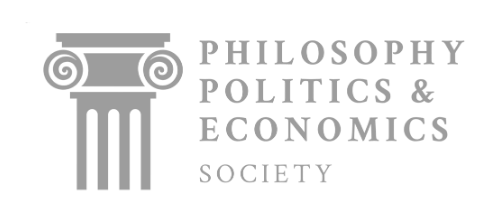The 2023 Gaus Memorial Essay Prize Winner Announced!
The PPE Society is pleased to announce the winner of the third annual Gerald Gaus Memorial PPE Essay Prize.

The 2023 Gaus Memorial Prize goes to Shiying Li (UW-Madison) for her paper, “Individuals, Norms, and the Basic Structure,” which argues that the Rawlsian “basic structure” should properly include at least some social norms. In particular, the essay argues that the basic structure should include those norms that work to shape the basic distribution of how rights and duties are realized in a society.
This essay offers a significant advance in how we can understand the domain of justice, and provides a tractable way forward to incorporating the analysis of informal arrangements alongside formal institutions into mainstream political philosophy. Judges find that this move is both interesting as an approach and consequential in how we then rethink our conception of a well-ordered society. This work is exciting in part because it creates a fertile ground for future research.
Li will receive a financial award from the PPE Society and the opportunity to present her work in a session with two other senior scholars at the 2023 Annual PPE Society Meeting in New Orleans, LA.
Abstract:
Critics of liberals such as Sally Haslanger (2017) and G. A. Cohen (1997; 2008) have charged mainstream liberal theories including John Rawls’s theory of justice as not able to account for the importance of cultures and ideologies due to their statist orientation. Rawls famously argued that principles of justice apply only to the basic structure, which many have interpreted as being constituted by formal institutions – the political constitution and the major economic and social institutions. However, Haslanger’s concept of social meanings is not clearly defined. Cohen’s overly broad and individualistic understanding of ethos makes it difficult to consider the ethos as a part of the basic structure. We run into the trouble of including all individual sentiments and attitudes into the basic structure. Instead, I would like to shift our attention to the concept of social norms. The account of social norms I adopt, largely in line with the one developed by Cristina Bicchieri (2005), has operational definitions and testable consequences. Thus, the model is explanatorily and predictively powerful. It is also widely used by social scientists and extensive empirical research on the origin, evolution, and impact of social norms and mechanisms of norm-following have been produced. Using results from empirical research, I argue that at least some social norms meet the Rawlsian criteria of the basic structure because they significantly affect the distribution of fundamental rights and duties and determine the division of advantages from social cooperation. Paradigmatic examples include those sustaining phenomena such as market-maximizing, gendered division of labor, and social stigmas. Like formal institutions, they exert coercive force on individuals, to a greater or lesser extent depending on situations and other factors, through various mechanisms. Social norms also meet the conditions of stability and publicity which are important considerations in Rawlsian theories of justice. Moreover, they fit especially well with an alternative characterization of the basic structure by A. J. Julius, as globally consequential, collectively alterable, individually unchosen, systematically action-shaping and goods-distributing. We not only underappreciate how some social norms have the same essential characteristics as formal institutions do. But we also have other moral and political reasons to subject them to the purview of justice, including our needs for a comprehensive approach to normatively evaluate social norms, and theoretical tools to develop theories of legitimate political interventions on norms.
In addition, I aim to shed light on another difficult question that has haunted many liberals especially those endorsing a more expanded understanding of the basic structure – what the content and the extent of individual duties of justice are. I do not attempt to provide a complete answer to this question, but I hope to advance our understanding by making some substantial suggestions. Even if my arguments fail to persuade my opponents, I hope that my discussion can at least highlight the moral and political significance of social norms, clarify the conceptual space on the issue of what demands justice makes on individuals, and lend support to a more expansive view on the issue. While I pursue these aims, I respond to proponents of a statist understanding of the basic structure such as Gina Schouten, A. J. Julius, and Samual Scheffler.
Winner Bio:
Shiying (pronounced Shih-ying) Li is a PhD candidate in philosophy at the University of Wisconsin-Madison. She mainly works in social and political philosophy, ethics, and the philosophy of education. Topics she has written on include social stigmas, distributive justice, the ethics of personal relationships and violent revolutions, social norms and self-respect.
